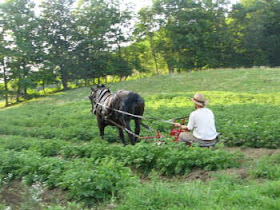 Willingly working on an organic farm (WWOOFing) has become somewhat of a trend as of late. Simply put, it means exchanging your labor on a farm without monetary compensation for room and board during your stay. The farm gets a free hand, and you get a vacation, escape from urbanity, or learning experience. I know a couple people who have jetted off to Costa Rica to work for free on a farm, and the November issue of Vogue tracks one fashion writer's foray into the Vermont wilderness with a trip to Luna Bleu farm. The reasons for these treks vary. Some want to take in a new and tropical surrounding with room and board provided for them, as my acquaintance in Costa Rica did.
Willingly working on an organic farm (WWOOFing) has become somewhat of a trend as of late. Simply put, it means exchanging your labor on a farm without monetary compensation for room and board during your stay. The farm gets a free hand, and you get a vacation, escape from urbanity, or learning experience. I know a couple people who have jetted off to Costa Rica to work for free on a farm, and the November issue of Vogue tracks one fashion writer's foray into the Vermont wilderness with a trip to Luna Bleu farm. The reasons for these treks vary. Some want to take in a new and tropical surrounding with room and board provided for them, as my acquaintance in Costa Rica did.Others seek a vacation that is out of the ordinary, gets them out of the city, and leaves a positive impact on the world rather than just a carbon footprint. The length of stay, number of hours of work, accommodations, and world region varies to your choice. There is a worldwide network of farms available to choose from at WWOOF.org. The tasks at each farm varies, as does the living situation. All that is promised is a clean, dry living experience, organic food fresh from the farm's produce, and a lesson about how the rural regions of the world exist.

These images are from Luna Bleu farm, and show cultivation of potatoes in progress. The Vogue staffer who travelled there helped to harvest chard and potatoes, to weed leeks, and collect heirloom potatoes. She learned some secrets to successful farming, like feeding laying chickens crushed oyster shells to make their eggs more study thanks to the calcium infusion. She learned the rewards of a hard day's manual labor, and the invaluable lesson of where the food we receive everyday in farmer's markets across NYC, and in grocery stores around the world come from.
I grew up in a rural area of Upstate New York, and as a country girl with two parents who either lived or worked on a farm as children, I take the understanding of how to cultivate my own food for granted. I knew the difference between a chicken and a rooster, and could identify a pepper, tomato, bean, or potato plant by sight in our large garden. I picked black caps and raspberries from their stems in my own back yard. If put to it, I could probably run a little farm that would generate enough produce to support me and my roommate at the very least given the appropriate seeds and cultivation space. Yet I feel this is a fading knowledge lost on many people my age, especially those born into urban areas. This fact was made all too clear to me when in my freshman year English class, the professor actually had to stop class to discuss the difference between a sheep and a goat. An understanding of where our food comes from besides an aisle in Morton Williams or Hannaford is simply something that is lost on many people.
I am happy to see a trend that is starting to reconnect people my age with such a basic, wonderful piece of knowledge. You have not truly lived until you have tasted a tomato off a freshly grown plant, still warm in the late August sun. There is simply nothing in the grocery store that compares in flavor. I hope that WWOOFing continues to pick up speed, and am definitely considering it for my next vacation.

No comments:
Post a Comment